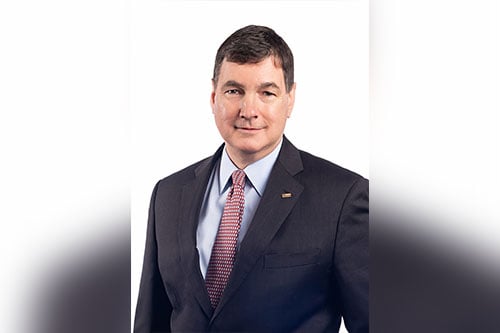

As businesses across North America pivot their operations amid ongoing shutdowns in many parts of the US and Canada, they’re approaching their insurance advisors with requests to amend their coverage. For one, the hospitality industry, including restaurants and hotels/motels, is seeing a decline in revenues during this time and contractions in its payrolls.
“We’re getting requests from those types of insureds to lower their premium base,” said Jeff Diefenbach (pictured), senior vice president and managing director at Burns & Wilcox, adding that on the other hand, other industries are seeing a growth in business during this time. “Many of our offices are seeing an influx of janitorial-type operations … The same [is true for] contractors that are erecting some of these temporary facilities, so while there’s a whole lot of decline in businesses, there are some industries that are actually growing during this time.”
Other businesses are meanwhile pivoting their operations, such as manufacturers that are now producing personal protective equipment (PPE), hand sanitizer, ventilators, and other goods that are in high demand. A Michigan-based plastics manufacturer focusing on the auto parts industry is now making plastic surgical gowns, while the popular North American pillow company MyPillow is pivoting to produce cloth face masks. This shift however brings new risks to the forefront for businesses who are following in these footsteps.
“This does a couple of things – it helps us all out and it keeps their employees working,” said Diefenbach. “But it’s changing their products liability exposure. They were making this part, that if it was designed incorrectly or if it failed, [it wasn’t a] big deal [because] it’s a door handle or something like that. Now, they’re making something that’s medical equipment that if it fails, they’re potentially subject to a much larger exposure.”
There are also many general liability or product liability policies that exclude medical parts manufacturing. After all, producing a pillow likely carries lower liability than making face masks. Businesses making this type of manufacturing switch-up need to stay in contact with their retail insurance agents and brokers to make sure that the program they have in place covers this new exposure and, if it doesn’t, these professionals can help businesses secure the proper coverage.
Notably, carriers are helping out insureds who need to amend their coverage during this period. Diefenbach told Insurance Business that he’s seeing carriers waive or reduce their minimum payroll requirements, effectively giving businesses a break.
“Carriers are more willing to play along with that than they had been in the past,” he said. “Their desire, our desire, the agent’s desire and the insured’s desire is not to have their program cancelled, but what can we do to make it more affordable or more reflective of what the actual exposure is now? We’re also seeing carriers provide some sort of relief or give extra time to pay a premium rather than just cancel it for non-payment. There isn’t an industry standard around that yet, but there’s more wiggle room than there had been in the past.”
Accordingly, keeping communication open between the insured, their agent or broker, and the carrier is critically important. Agents and brokers can do their part by maintaining close contact with their insureds and making sure that they understand the exposures their businesses may have picked up.
For example, many commercial and personal properties could be vacant for long periods of time during a government-mandated shutdown, and some policies void coverage for damage if a property has been vacant for 30 or 60 days. It’s thus problematic if the policyholder and their insurance agent or broker haven’t stayed in touch, and the agent hasn’t gone back to the carrier to explain what’s going on and ask to potentially take that 60 days and bump it out to 120 days or take the clause out entirely.
“There are several different ways that various carriers are adapting to those requests, but the carriers don’t really know which policies are affected unless the agent was talking with their insured and gets back to that carrier,” said Diefenbach.
Communication could be complicated since business owners and personal insureds might not be available at their typical locations, but that just means agents and brokers have to be persistent with keeping in touch.
“The whole chain – the insured, the agent or broker, and the carrier – has to understand what changes in exposure that insured ultimately might have because of all the events that are taking place now,” explained Diefenbach.
